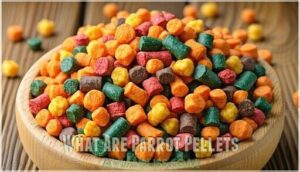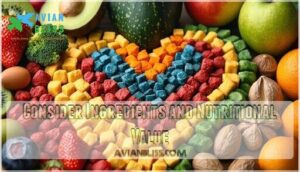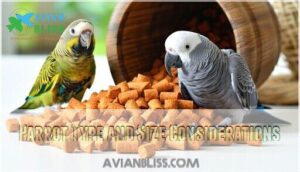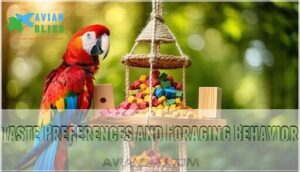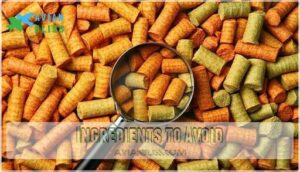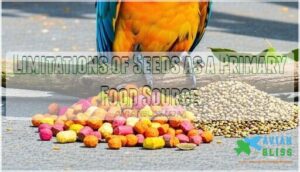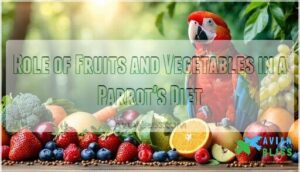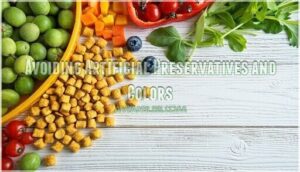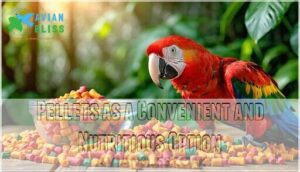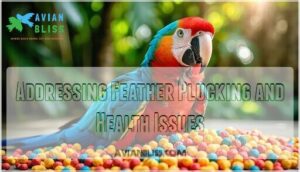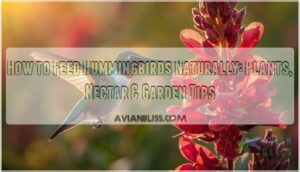This site is supported by our readers. We may earn a commission, at no cost to you, if you purchase through links.
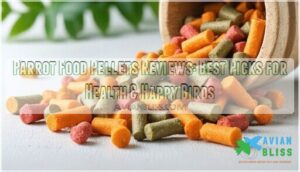
Pellets like Harrison’s and Zupreem are popular for their balanced mix of vitamins and minerals.
They’re a great alternative to seed-only diets, which can lack essential nutrients and lead to health issues like obesity.
Different brands cater to specific needs, from weight control to feather health, so match the pellet to your bird’s size, species, and preferences.
Avoid fillers, artificial colors, or preservatives, as a good pellet keeps your feathered friend happy and healthy—because isn’t that what we all want?
Table Of Contents
- Key Takeaways
- What Are Parrot Pellets
- How to Choose The Right Parrot Pellets
- The Importance of a Balanced Diet
- Addressing Feather Plucking and Health Issues
- Frequently Asked Questions (FAQs)
- Which pellet is good for a parrot?
- Do parrots eat pellets?
- What is the best type of parrot food?
- Are parrot food pellets good for hookbills?
- Should you start your parrot on pellets?
- What should I look for when buying parrot pellets & bird seeds?
- What are the healthiest pellets for parrots?
- What is the best food to feed a parrot?
- Should I give my parrot seed or pellets?
- What is the healthiest seed for parrots?
- Conclusion
Key Takeaways
- Look for nutrient-rich pellets like Harrison’s or Zupreem that provide balanced vitamins and minerals, avoiding fillers or artificial additives.
- Match the pellet size and type to your parrot’s species and preferences to ensure proper nutrition and easy feeding.
- Gradually introduce pellets while supplementing with fresh fruits and vegetables for a complete and varied diet.
- Monitor labels and avoid pellets with artificial preservatives, colors, or unnecessary additives to keep your parrot healthy and happy.
What Are Parrot Pellets
Parrot pellets are nutritionally balanced food made from ground ingredients like seeds, grains, and vegetables, often fortified with essential vitamins and minerals.
Parrot pellets offer balanced nutrition, vibrant feathers, and a healthier, happier life for your feathered friend.
They’re designed to provide consistent, complete nutrition and prevent selective eating habits that can lead to deficiencies, by offering a complete nutrition profile.
Definition and Importance of Parrot Pellets
Parrot pellets are a reliable way to guarantee your bird gets the nutrition it needs.
These pellet blends mimic a parrot’s natural diet and promote good health.
- Nutritional Completeness: Packed with essential vitamins and minerals.
- Pellet Composition: A mix of seeds, fruits, grains, and vegetables.
- Preventing Deficiencies: Balances nutrients often missing in seed-based diets.
- Digestive Health & Feather Quality: Supports gut health and vibrant plumage.
When picking the best parrot pellets, check parrot pellet reviews to match your bird’s needs.
To guarantee a balanced diet, consider ingredient transparency and trust.
Types of Parrot Pellets
When choosing parrot food pellets, there’s a wide variety to explore.
Some offer textured designs for foraging enrichment, while others focus on organic ingredient sourcing, like cold-pressed Organic Pellets.
Consider pellet sizes to suit your bird’s species, ensuring they’re easy to eat.
Look for fortification levels that support balanced nutrition and brands offering flavor variety to match taste preferences.
Trusted parrot pellet reviews can guide you toward the best parrot pellets formulated for health and happiness.
Benefits of Parrot Pellets
Switching to parrot pellets has perks that go beyond simple feeding. These tidy, compact morsels of parrot food are scientifically crafted to provide Complete Nutrition. Unlike seed-heavy diets, pellets Prevent Deficiencies by offering a balanced mix of vitamins and minerals, boosting overall parrot nutrition and health.
Scientifically crafted parrot pellets deliver complete nutrition, preventing deficiencies and promoting vibrant health for happier, thriving feathered friends.
- Digestive Health: Pellets are easy to digest and keep your bird’s system running smoothly.
- Feather Quality: They enhance feather vibrancy, mimicking a parrot’s natural diet.
- Weight Control: Pellet formulas prevent obesity, promoting activity and wellness.
- Convenience: They reduce mess and selective eating.
Ultimately, adding parrot pellets guarantees your feathery friend thrives with superior parrot health and happiness!
How to Choose The Right Parrot Pellets
Choosing the right parrot pellets means checking for high-quality ingredients and ensuring they provide complete nutrition.
You’ll also want to match the pellet size and texture to your parrot’s species and feeding habits for ideal health.
Consider Ingredients and Nutritional Value
Smart choices start with reading parrot food ingredients closely.
Look for organic options, GMO-free labels, and parrot pellets with high nutritional value.
Prioritize brands offering diverse protein sources and avoid artificial additives like chemical preservatives or unnatural colors.
Balanced vitamins and minerals guarantee nutritional completeness; low-quality pellets often skip these essentials.
Reliable parrot food reviews often highlight clean ingredient sourcing, natural preservatives, and improved parrot pellet formulas.
Consider supplementing their diet with organic parrot options for peak health.
Remember, better nutrition means brighter feathers and longer, happier lives!
Parrot Type and Size Considerations
Picking the best parrot food pellets depends on your bird’s size and type.
Aim to meet species-specific nutrition needs to keep health steady:
- Small parrots: Try Small Parrot Pellets for easier chewing. You can find various pellet options online.
- Macaws: Prioritize high-fat Large Bird Food for energy.
- Caiques: Focus on fruit-heavy diets.
- All types: Verify that pellets match parrot food brands‘ size guides.
Taste Preferences and Foraging Behavior
Parrots have unique taste preferences, so explore flavor variety and textures when selecting parrot pellets.
Mimicking their wild diet encourages natural foraging. Use foraging toys to make meals engaging, enriching their behavior.
Don’t solely trust reviews—watch how your bird reacts to new pellets. Balancing pellet acceptance with fun keeps your parrot happy while promoting good eating habits.
Weight Management Options
Balancing your parrot’s taste and health starts with Low-Fat Pellets and proper Portion Control. Overfeeding can lead to weight issues, so adjust servings based on size and activity levels—small birds need less, larger ones more.
Exercise Integration is also key; provide toys or encourage climbing for that extra burn. Some parrot food pellets include Metabolic Boosters to help regulate weight naturally.
Consider specialized parrot nutrition for peak health. Remember, a Gradual Shift to healthier parrot food avoids stress and helps your bird embrace the change with ease.
Ingredients to Avoid
When choosing parrot food pellets, watch for ingredients like artificial colors, excess sugars, harmful preservatives, and high salt—these can harm your parrot’s health.
Avoid parrot pellet ingredients with toxic metals or GMOs, as well as corn-based fillers that lack nutritional value. Your parrot’s diet should focus on wholesome, balanced options instead of empty calories.
Checking labels helps guarantee you’re offering nutritious food, not sugar-laden snacks. A healthy bird is a happy bird—and careful ingredient selection makes all the difference.
To guarantee your bird’s safety, consider organic seed options for their nutrient-rich and non-toxic qualities, ensuring a happy bird with a diet that includes non-toxic ingredients.
The Importance of a Balanced Diet
Your parrot’s health depends on a diet that balances nutrients from pellets, seeds, fruits, and vegetables.
Feeding a variety of foods guarantees they get essential vitamins, minerals, and proteins while staying active and happy.
Limitations of Seeds as a Primary Food Source
Seeds might seem like simple parrot food, but they fall short of meeting a parrot’s nutritional needs.
A seed-heavy parrot diet often leads to nutritional deficiencies, high fat content, and selective eating habits. This can cause serious health problems, like obesity and vitamin deficiencies.
Mix seeds with other foods:
- Parrot pellets for complete nutrition
- Fresh foods to add variety
- Vet-approved diets for overall health
Role of Fruits and Vegetables in a Parrot’s Diet
A well-rounded parrot diet isn’t complete without a mix of fresh fruits and veggies—like a gourmet salad for your bird!
Stick to 80% veggie nutrition, 20% safe fruits to avoid sugar overload. Focus on variety: carrots, leafy greens, and berries are excellent choices.
Prepare by washing and chopping into bite-sized pieces. Portion sizes matter—moderation keeps digestion smooth.
To guarantee they receive all necessary nutrients, offer high-quality pellets alongside fresh foods. Balanced meals, paired with parrot food pellets, deliver essential nutrients, guaranteeing your bird thrives with a healthy, colorful, and flavorful diet.
Avoiding Artificial Preservatives and Colors
Reading labels on parrot food pellets isn’t glamorous, but it’s worth the effort.
Avoid artificial preservatives and colors—they can lead to long-term effects on your bird’s health.
Opt for healthier pellets made with natural alternatives or organic ingredients, ensuring your bird’s well-being.
Brand transparency is key; trust companies that prioritize quality over shortcuts.
Remember, a cleaner ingredient list supports a happier, healthier parrot, and makes feeding time more worry-free for you.
Pellets as a Convenient and Nutritious Option
Parrot pellets are a convenient way to keep your bird healthy and full of energy.
They’re designed to mirror a parrot’s natural diet, offering balanced nutrition without the guesswork.
With impressive pellet variety and digestibility, switching to them is simple—most parrot pellet brands cater to different tastes.
Pellet manufacturing focuses on nutrient-packed ingredients, leaving little room for deficiencies.
Store pellets properly in airtight containers to maintain freshness.
Gradual pellet introduction guarantees smooth adaptations, making them a favorite in parrot food reviews with a focus on healthy and full of energy concepts.
Addressing Feather Plucking and Health Issues
Feather plucking in parrots is often tied to stress, poor nutrition, or environmental issues. Choosing high-quality pellets with balanced nutrients can support feather health and address underlying causes effectively.
Common Causes of Feather Plucking
Feather plucking can be tied to several factors, warning you about your parrot’s health.
Here’s what to watch for:
- Dietary Deficiencies: A poor diet may lead to irritations; parrot pellets offer balanced nutrition to help.
- Boredom and Plucking: Lack of stimulation causes this behavior, so introduce toys or challenges.
- Parasites and Plucking: Mites or lice irritate feathers—consult a vet promptly.
- Toxicity and Plucking: Remove toxic foods and materials.
- Psychological Trauma: Stress triggers plucking; provide a calming environment.
Environmental and Social Factors
Your parrot’s space and social surroundings are essential to prevent feather plucking. Choose a spacious cage with toys to foster engagement and mental stimulation.
Offer ethical, ecofriendly practices by using sustainable sourcing and parrots’ local ingredients. Quiet environments reduce stress, while a companion, whether another bird or your time, promotes happiness.
Use parrot food from companies with biodegradable shipping supplies, emphasizing ethical sourcing.
| Essentials | Benefits |
|---|---|
| Roomy Cage | Encourages movement and well-being |
| Fun Toys | Prevents boredom and destructive habits |
| Companionship | Boosts social bonds |
| Quiet Environment | Lowers stress |
| Quality Pellets | Enhances health and supports energy |
Relaxation and Stress Reduction Techniques
When stress surfaces, keep your parrot happy with relaxation techniques. Start with enrichment activities like foraging toys to challenge their curious minds. Introduce calming sounds, such as soft bird-safe music, to create a soothing atmosphere.
Schedule quiet moments daily by dimming lights to mimic evening roosting. Strengthen their bond through positive reinforcement during calm behavior, rewarding their peace.
Make certain regular social interaction to meet emotional needs, and try simple training techniques to channel energy productively.
Feather plucking could signal nutritional gaps—make sure their diet includes high-quality parrot pellets for balanced avian nutrition. Reviews for species-specific pellets can direct you toward the best options.
Addressing potential issues like emotional and physical stressors is vital for preventing this behavior.
Frequently Asked Questions (FAQs)
Which pellet is good for a parrot?
Imagine crafting a customized suit for health—TOP’s Organic Pellets are exceptional.
They’re USDA-certified, non-GMO, and peanut-free, supporting your parrot’s nutrition with high-quality ingredients.
While mimicking their natural diet for superior health and vitality is key, TOP’s Organic Pellets deliver with high-quality ingredients.
Do parrots eat pellets?
Yes, parrots can eat pellets.
Pellets provide balanced nutrition, mimicking natural diets.
They’re easy to serve and reduce picky eating.
Introduce them gradually, as parrots might take time to accept this new food option.
What is the best type of parrot food?
The best parrot food combines high-quality pellets (like Harrison’s or ZuPreem), fresh fruits, and vegetables.
Pellets offer balanced nutrition, while fresh foods add variety and essential vitamins.
Avoid processed treats and overfeeding seeds.
Are parrot food pellets good for hookbills?
Think of Ellie, a vibrant Amazon parrot thriving on pellets.
Pellets are fantastic for hookbills, offering balanced nutrition, promoting feather health, and preventing deficiencies.
Just guarantee variety with fresh fruits and veggies for superior results.
Should you start your parrot on pellets?
Switching your parrot to pellets guarantees balanced nutrition, helping prevent deficiencies common with seed-heavy diets.
Start gradually, mixing pellets with familiar food.
Monitor their eating habits, and stay patient—it’s a change worth the effort.
What should I look for when buying parrot pellets & bird seeds?
Choose pellets with natural ingredients, no artificial additives, and balanced nutrients.
Opt for seeds with low sunflower content and added vitamins.
Make certain variety, including fruits and vegetables, for a complete diet.
Store properly.
What are the healthiest pellets for parrots?
Focus on organic, non-GMO pellets like TOP’s or Harrison’s, free from artificial additives.
They offer balanced nutrients, promote feather health, and mimic natural diets.
Introduce gradually for picky parrots and always pair with fresh foods.
What is the best food to feed a parrot?
Over 70% of a healthy parrot’s diet should be pellets, like ZuPreem or Harrison’s.
Pairing these pellets with 30% fresh fruits and veggies is essential, as balance is key.
Avoid fatty seed-heavy mixes and always provide clean water.
Should I give my parrot seed or pellets?
Pellets are nutritionally balanced and ideal for daily feeding, covering essential vitamins and minerals.
Seeds can be given occasionally but lack complete nutrition.
A mix of pellets, fresh fruits, and vegetables works best for parrot health, providing complete nutrition.
What is the healthiest seed for parrots?
Hulled sunflower seeds are a solid choice for parrots, offering essential fats, protein, and nutrients.
However, limit portions and mix with other seeds and pellets to avoid excess fat while providing balanced nutrition.
Conclusion
Surprisingly, choosing the right parrot food pellets isn’t as tricky as it seems.
With options like Harrison’s and Zupreem, you can provide a balanced diet that keeps your bird healthy and happy.
Focus on nutrient-rich pellets suited to your parrot’s size, species, and preferences, avoiding fillers or artificial additives.
Don’t forget, pellets complement fruits, vegetables, and foraging, which is crucial for supporting your bird’s long and vibrant life.
By exploring parrot food pellets reviews, you’re one step closer to supporting your bird’s overall well-being.
- https://www.reddit.com/r/parrots/comments/12vnxj0/what_is_a_good_brand_of_pellet_food_for_birds/
- https://m.youtube.com/watch?v=IprQFxg4Wtg
- https://www.amazon.com/stores/TopsParrotFood/page/2C634BCE-7C9D-461E-A50A-AB9B272237DA
- https://www.parrotforums.com/threads/totally-organics-top-pellets-review.23879/
- https://lafeber.com/pet-birds/species/african-grey-parrot/

